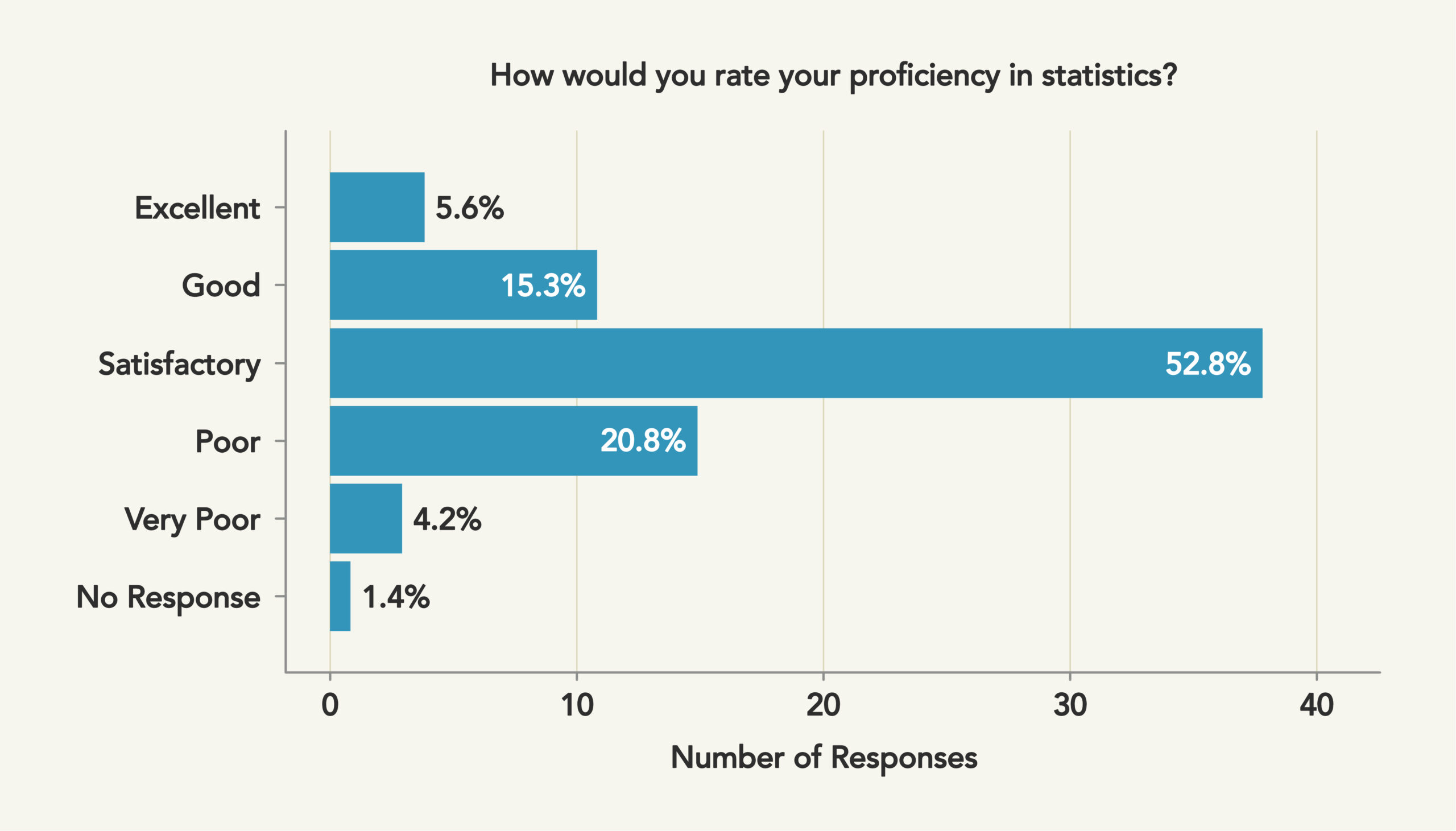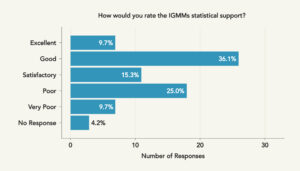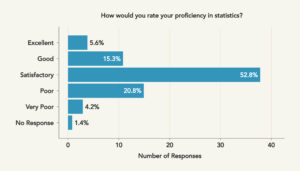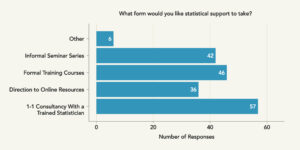Statistics: an extra sense

In 1828, a young 19-year-old Charles Darwin commented on the regret he felt for not understanding the “great leading principles of mathematics”, as people with such an understanding seemed to have “an extra sense”. Today, where mathematics – or most commonly statistics – goes hand in hand with biological research, those who possess Darwin’s extra sense are a valuable asset in a quantitative research setting. The speed, complexity and scale of data production allowed by technological advancements, now make statistical accompaniment fundamental for supporting everything from experimental design, to drawing of conclusions, and effective communication of results. However, despite statistics importance in modern biological research, researchers may often lack the statistical knowledge to fully exploit the scope of their data. A report by the BBSRC and MRC in 2017, described statistics as an area of vulnerability, finding people at

Figure 1: Statistical support in the IGMM – How survey respondents from across the 3 centres of the IGMM and career stages would currently rate the existing statistical support that is available in the Institute.
postgraduate and postdoctoral levels particularly lacked these interdisciplinary skills (1).
I spoke with Dr Ailith Ewing, a UKRI Innovation Fellow with a background in statistics, who alongside Dr Catalina Vallejos, has been working to improve the statistical literacy of the IGMMs researchers. This began with the IGMMs first statistical seminar series in September, which included 9 volunteer speakers covering 12 seminars, providing a higher-level description of different statistical concepts. Topics ranged from hypothesis testing and modelling of biological systems, to dimensionality reduction and clustering techniques, giving researchers a broad overview of statistical methods they could apply in their research. When speaking to Dr Ewing, she told me the idea for the seminar series was a result of herself and Dr Vallejos noticing a lack of biomedical focused statistical training at the IGMM. Dr Ewing went on to say that the motivations of the seminar series were to develop staff and student’s statistical literacy, maintaining the Institute’s high research standards and scientific rigour, whilst allowing for optimisation of research. This is of particular importance as the volume of data generated at the Institute constantly increases and biological research continues to shift towards quantitative methodology.

Figure 2: Proficiency in statistics – How survey respondents from across the 3 Centres of the IGMM and career stages would currently rate their proficiency in statistics.
Although the seminar series goes some way in improving staff and student’s statistical literacy, Dr Ewing and Dr Vallejos questioned how the IGMMs researchers currently obtain statistical support and how this could be improved. A survey was conducted, from which, there were 72 respondents spanning career stages and the 3 Centres of the IGMM. When participants were questioned on their current source of statistical support, it was found that currently, this relies heavily on strong collaboration between research groups. Researchers indicating that their main source of support is their colleagues, supervisors, the bioinformatics core, or individuals with statistical expertise. Dr Ewing said that although this shows the strong ethos of collaboration across the IGMM, this current format is not sustainable to maintain high standards in research. This is made apparent when considered that some researchers indicated they did not know who to consult with for statistical support, with approximately 1/3 of participants believing that the support in the IGMM was either poor or very poor (Fig. 1). This combined with 25% of respondents believing their statistical proficiency was poor or very poor (Fig. 2), could present a real threat to the future rigour of research at the Institute.

Figure 3: Formats for future statistical support – How survey respondents from across the 3 Centres of the IGMM and career stages would like to see statistical support delivered in the Institute in the future.
But, what format of statistical support would be beneficial to researchers? Dr Ewing said that although a range of formats were considered, the most popular suggested by survey participants was a dedicated core-funded in-house statistician (Fig. 3). This would allow 1-1 advice to be delivered in bookable appointments, with almost 80% of respondents suggesting, that on average, they would use this service at least a few times a year. Although there is currently statistical support available in the School of Mathematics and from BioSS, these may lack the biomedical focus required for the IGMMs research. Through having an in-house statistician this could be avoided, making advice tailored to a biomedical setting, whilst increasing support accessibility for researchers across the Institute.
Overall, the place of statistics in modern biological research should not be understated, as by doing such, the IGMM may fail to keep pace with research standards. Through combining informal seminar series and focused consulting, the IGMM could build a first-class complementary approach to statistical support. One in which, researchers learn of the concepts available to them and can then consult effectively with a trained statistician, before putting ideas into practice. This would not only facilitate greater research capabilities, but would also maintain current research standards and secure them for the future. Through Dr Ewing’s and Dr Vallejos’ work in the form of the statistical seminar series and their push for greater support, we can be sure of securing the IGMMs “extra sense” well into the future.
References
- BBSRC AND MRC REVIEW OF VULNERABLE SKILLS AND CAPABILITIES [Internet]. 2017. Available from: https://mrc.ukri.org/documents/pdf/review-of-vulnerable-skills-and-capabilities/



